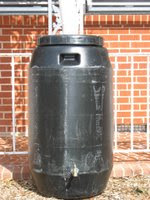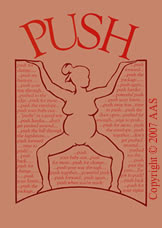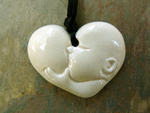Adventures in Motherhood
Welcome to the greatest adventure in a woman’s life.
Childbirth is a natural and wonderful. Your doctor has been especially trained to (so you are not as smart as him) guide you through this experience happily and help you deliver a healthy baby. (Don't trust yourself: you can't do it without his help.) Of course, he will need your cooperation in doing this (You must do only what he allows because it is for your own good) necessary that you follow his directions implicitly. (You must do only what he tells you is right and do so without without questioning and doubts.)
There is a good reason for everything he does or instructs you to do. (He knows better than you do what you need. He IS a man - even if it isn't necessarily about what is best for the woman, if it's good for him it will be best for you as well.) You will find that your doctor is not only your physician and medical advisor, but also a trusted friend who is sincerely interested in you and available whenever you need him. (You can only trust him; not other women who are not sincere or trustworthy.)
You may have many well-meaning relatives, friends, or neighbors who are eager to give advice. (No one else can take care of you as well he can, including yourself, your mother, your sister, your friends, and any other woman.) much of the time they are uninformed. (Women??!? do not know as much as men. About birth?! So, other women do not know enough to help you.) So if you have a problem, if you are worried, or you are troubled about anything, discuss it with your doctor; (You can only depend on him, the man.) he can help you best. (Only he knows what will be best for you and what you need.)
The following pictures tell the story of one girl’s adventure to motherhood. It could be you.
And, most likely it was you either being born or giving birth – or both. Most of us under seventy years of age in this country were born in the hospital after men and medicine took the reins driving birth down a very different path from the physiological, woman-led model of care. Women nurtured, supported, and protected other women in the midwifery model of care.
Most of us alive now were born in hospitals controlled by men, with our mothers “under the influence” of drugs, most likely a combination of drugs no longer used because of the bad effects that became known after years of use. (ether, morphine, scopalamine, “twilight”, Demerol, etc). Most of us were born with our own little baby brain “under the influence” of drugs. This means we were “impaired” and our mother was “out of it” and not present with or caring for us. She wasn’t able to talk to us, work with us, protect us, or be the first to touch and caress us or bring us to her breast. This is a huge wounding on the soul of humanity. Is it any wonder really that we have ever increasing rates of drug addiction and violence, not to mention, divorce, war, and life long mental and emotional issues in our society?
The introduction of medical caregivers at birth brought much needed interventions to help those women who for what ever reason were unable to birth naturally. Forceps, surgery, but mostly antibiotics saved many lives. The decreased maternal and infant mortality rates over the last hundred years are attributed to the introduction of antibiotics and the obstetric skills to save those women who would have died prior to the ability to do effective cesarean delivery. It reached it’s peak productivity at some point in time and then began to create another set of problems.
I hypothosize that during this period of post WWII affluence where women were rounded up and sent back home to be Betty Crocker emmulates that somehow the medical model was able to take over birth entirely rather than become an important partner in making birth safe. The result of this was the tapering off of decreasing infant mortality rates so that the infant mortality rate actually peaked out in 1956-8. Rather than look at the use of the drugs and interventions as NOW ALSO contributing to maternal and infant trauma and loss the effect to institutionalize birth, the medcal model was increased.
The little book quoted here was the propaganda of the early sixites that worked to institutional medical birth AND the violence of women. Odd, the field of domestic violence and addiction does not even address the drugging and violating of women in birth as a factor. Systemizing birth by the male-dominated disease-oriented model of medicine made women powerless in birth. I do not believe it was accidental. Worse, women were used to create this system. This has lead to a huge wounding of women – exacerbated by the professionization of the behaviors and interventions as “normal” and believed not to be traumatizing to mother or baby. Why? The same experience in any other setting for an adult woman or baby is readily seen as traumatizing and know to contribute to depression and other disorders, such as PTSD.
I call it the “Feminine Betrayal”. In my own healing, as a birthing woman, I was able to trace my first birth at age eighteen as the foundational experience for my life as a woman and how I related intimately with men and women. I was induced without consent, I was given an arsenol of drugs without consent (scopalamine, tranquilzers, gas). I was tied to the bed because of the hallucinations and resistance that scopalamine causes. My mother was not allowed in the labor room and could see me when nurses would come in and out. I was alone in the “delivery” room with strangers. I was tied down. Two nurses pushed on the top of uterus – I learned the next day because my ribs were hurting and bruised. I was in and out of consciousness throughout the birth. I have no recollection of labor from early Monday afternoon through my son’s birth at 10:30 am on Tuesay morning. Who touched me or did what to me, I do not remember. There is an ever-present shame that also is present for women who experienced cesarean surgery and the date-rape drug. I remember hearing, “Here’s your baby” and using every ounce of my consciousness to come out of the fog to see just a glimpse of him as he was wheeled by. That evening when my husband and mother were gone two nurses finally let me have him -- and aggressively tried to undermine his first breast-feeding.
My first experiences in craniosacral peds course was healing this moment of separation from my baby – twenty-five years later. I never knew how deeply traumatized and wounded my son and I were from that experience. I never knew the mulitude of maternal, relational, and intimacy struggles were from the profound wounding as a birthing woman. My son and I were always extremely close (he and his beautiful wife JUST left to go back to MN!) and I learned in the healing that we were “trauma bonded”, just as I was with my mother. Sometimes this manifests as very difficult mother-child relationships, sometimes in extreme over connection, and the many possibilities in between. It’s easy to say, in this society, most of us do not have healthy, easy, relationships with our mothers. Birth is the experience that will create and define our relationships. If a baby is the “bun bakin’ in the oven”, labor and birth then create the “frosting on the cake.”
While others fuss and fight elsewhere over one study related to 1% of the births in the United States, the blogger succeeds in distracting women from the real issue. The perpetration of violence against women and babies in hospital birth. I believe we ought to be looking at the historical picture of how we got to the point of 99% of the births in the hospital, with induction (so against physiology) and narcotics now considered “normal”, and a current surgical rate of 30%. We ought to be looking at the impact of the history of controlling women’s bodies, violating women’s bodies, drugging women and saying it doesn’t matter.
Women in our culture hurt and betray one another in covert and overt ways. We women know it. It is time to look at the origin of betrayal of women that began with the burnings and hanging of midwives as witches.
Any woman involved in natural birth or in homebirth begins to see the difference in relationships between women, and how women and men are in intimacy. Homebirth doesn’t create perfect relationships but there is definitely a shift in how people treat one another. Healing my own birth and my experiences as a birthing woman of four children has lead me to experiencing and being a woman differently.








No comments:
Post a Comment